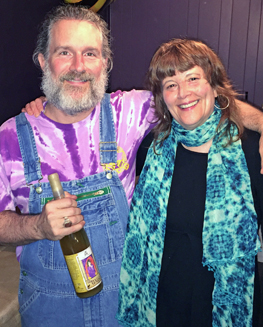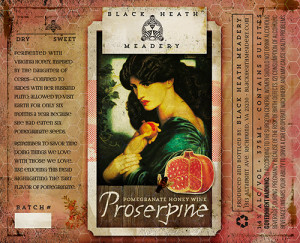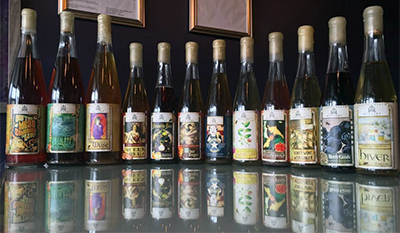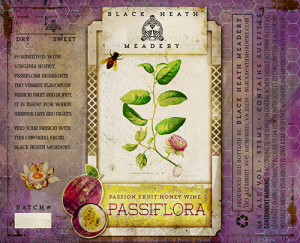Bill Cavender, Owner of Black Heath Meadery, Richmond, Virginia

Photo courtesy Trevor Dickerson, Richmond Times-Dispatch
Something as small as a honeybee can inspire big ideas. For Richmond mead maker Bill Cavender, the honeybee’s role in one of the world’s oldest fermented beverages inspired him to start the city’s first meadery.
Black Heath Meadery opened in early 2015 for production, tours and tastings. For Cavender, it’s the culmination of years spent home brewing, farming and beekeeping. Since living next door to a beekeeper as a child, he says he’s always been intrigued by honeybees and learned all he could about their intricate social structure, not to mention the many ways honey can be used.
“Honey has always been a magical thing for me — how do these tiny insects create such a wonderful product to look at, to smell, and to taste?” he says.
Mead itself is the culmination of the ancient tradition of fermenting honey, water and yeast. Thousands of years ago, it was produced everywhere in the world but until recently its major production areas had dwindled to pockets of Scandinavia, the British Isles, the Baltic states and southern Africa. Now, however, according to the American Mead Maker Association, mead is the fastest growing alcoholic beverage category in the U.S.
Cavender says The Perfect Purée plays a big role in his formula. He is committed to sourcing most of his ingredients from Virginia, like honey, cider, ginger and berries, but needs more exotic fruits to diversify his flavor profile. He says during his research and development phase, he experimented with a number of purees and concentrates and found The Perfect Purée’s products had the best flavor and color. So far, Cavender has used The Perfect Purée Passion Fruit and Pomegranate Concentrate for seasonal releases.
“Our goal was to reintroduce people to this amazing beverage by supporting local beekeepers and farmers in Virginia and beyond [and] while we are fortunate to have abundant fresh fruits in Virginia, there are some flavors that we just can’t do without,” he says. “The aroma and vibrant, tart flavor of passion fruit is a natural component for a summer mead. Pomegranate is another flavor that just bursts out of the glass and catches attention with its lovely color.”
 Traditional meads can be anywhere on the flavor spectrum from bone dry to dense, sweet and cloying. Black Heath’s meads fall somewhere in the middle with a semi-sweet taste and 1.5 percent residual sugar. Building on the traditional mead base of honey, water and yeast, Cavender adds fruits and spices to the secondary fermentation, a process that highlights the full fruit flavors while allowing the honey to play a role in the overall flavor profile.
Traditional meads can be anywhere on the flavor spectrum from bone dry to dense, sweet and cloying. Black Heath’s meads fall somewhere in the middle with a semi-sweet taste and 1.5 percent residual sugar. Building on the traditional mead base of honey, water and yeast, Cavender adds fruits and spices to the secondary fermentation, a process that highlights the full fruit flavors while allowing the honey to play a role in the overall flavor profile.
“In the case of our passion fruit mead, the tart citrus flavors of the fruit intermingle with the honey for an amazing flavor,” Cavender says.
Named Passiflora, the passion fruit mead is a perfect drink for Virginia’s hot, humid summer weather and pairs well with fruit, cheese, or meat. Cavender says fruit meads in general also tend to complement spicy food — Thai, Vietnamese, Indian, Ethiopian and Mexican — by tempering the heat with the honey flavor.
Cavender says mead’s versatility encourages experimentation and for future releases he is looking forward to using The Perfect Purée Sweet Hibiscus blend, Black Currant Puree, Lychee Puree, and others.
“The market has been very receptive to our meads,” he says.
 For someone who enjoys looking at a well-designed bottle as much as drinking it, the artwork on Black Heath’s bottles makes them unique enough to spare from the recycling bin and place on a shelf for decoration. Detailed botanical prints overlaid with a honeycomb pattern and medieval-style text reflects mead’s ancient origins, and evokes the mystical mood Black Heath is trying to cultivate.
For someone who enjoys looking at a well-designed bottle as much as drinking it, the artwork on Black Heath’s bottles makes them unique enough to spare from the recycling bin and place on a shelf for decoration. Detailed botanical prints overlaid with a honeycomb pattern and medieval-style text reflects mead’s ancient origins, and evokes the mystical mood Black Heath is trying to cultivate.
The drawing of the passion fruit on Passiflora’s bottles is a royalty-free image that dates to the 1800s, while the image of Proserpine (a Roman goddess) on the bottles of pomegranate honey wine is a famous oil painting completed in 1874 by the Pre-Raphaelite painter Dante Gabriel Rossetti.

